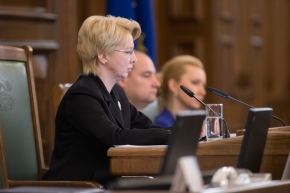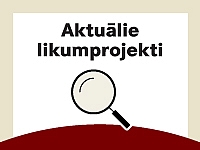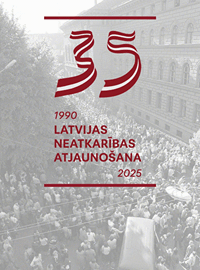 VideoGalerija
VideoGalerija
Together with other countries in the region, Latvia has understood at an early stage that the need for security is a priority. This reveals Latvia and the Baltic region as a sensitive international seismograph which detects regional geopolitical challenges, notices potential eruptions before others are aware of them and calls for measures to deal with them. This was emphasised by Ināra Mūrniece, Speaker of the Saeima, on Thursday, 22 January, in her address at the annual Foreign Policy Debate in the Saeima.
The Speaker of the Saeima described 2014 as a turning point when the Baltics, whose previous concerns had gone unnoticed by the rest of Europe, became the initiator of reinforcing security.
The Speaker assessed the report by the Minister of Foreign Affairs as a broad, comprehensive, and stimulating document that sets out specific directions for future foreign policy tasks, and she thanked everyone involved in drafting the report for a job well done.
When analysing the report, Speaker Mūrniece highlighted several aspects which are vital to Latvia’s interests. She stressed the need to strengthen Baltic – Nordic cooperation in the NB8 format, pointing out that, along with NATO, the countries of the Baltic Sea region play a crucial role in Latvia’s ability to defend itself.
The Speaker also highlighted the significance of opening the NATO Centre of Excellence for Strategic Communications in Riga, describing it as an important investment by Latvia in the work of the North Atlantic Treaty Organisation. Latvia’s energy security was another important aspect mentioned by the Speaker in her address. Speaker Mūrniece emphasised the need to implement the EU’s Third Energy Package and described the previous year as a wake-up call when the EU had to stop hesitating in dealing with energy dependency issues.
Speaker Mūrniece mentioned two practical initiatives which have strong potential to improve the media work. One of these is the creation of a high-quality and modern European Russian-language news channel to counter the disinformation campaign carried out by Russia. Another tool could be amending the Audiovisual Media Services Directive in order to improve the legislative framework at the national level and strengthen the media environment.
Regarding Latvia’s Presidency of the Council of the EU, the Speaker of the Saeima acknowledged that it will be full of challenges that will require considerable flexibility and the ability to react quickly: “This was proved by the events in France and Belgium in early January which spotlighted security as our most important task”. The Speaker mentioned the need to take a clear stand on security issues pertaining to Russia’s aggression in Ukraine as another challenge that our presidency will have to deal with.
Regarding the Ukraine issue, Speaker Mūrniece stated that Ukraine’s problems, including economic and institutional ones, are problems for the whole of Europe. “Ukraine is fighting our war, but one day we may get the bill,” said Speaker Mūrniece.
The Speaker stated that it is crucial to continue working on recognising the militant groups in Donetsk and Luhansk as terrorist organisations. “This will be unpleasant for Russia because no one likes to have their deeds recognised for what they truly are. However, the terrorists supported by Russia have taken thousands of lives, and shirking responsibility is unacceptable.”
The Speaker urged the audience not to lose sight of values amidst security concerns. Paraphrasing French politician and economist Jacques Delores, she pointed out that we need more than a single market to fall in love with Europe –- Europe also needs a soul. “The soul of Europe is its indisputable values: peace, a strong historical memory, cultural and communication traditions, attractive individual welfare combined with implementation of the principles of social justice, a green, unpolluted environment and freedom,” Speaker Mūrniece said in concluding her address.
Saeima Press Service









